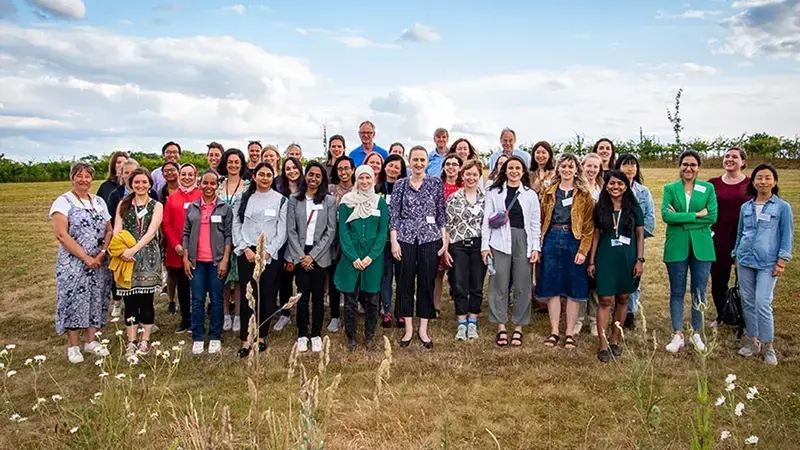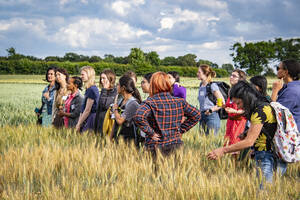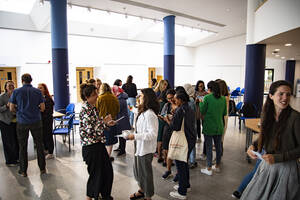Empowering Early Career Women Scientists: ICARDA at the Women in Wheat Training Workshop in Norwich

By Dr. Anna Backhaus, ICARDA Cereals Scientist and alumnus of JIC and the WIW training program
The attendance of the ICARDA members at the workshop was possible through the support of the Rosalind Franklin Women in Wheat Champions program, which is funded by The Royal Society and BBSRC, with additional funding kindly provided by PhenomUK.
Three ICARDA early-career scientists attended a 2-day career development workshop at the prestigious John Innes Centre in Norwich, England. The training covered key aspects of managing science projects and included a focus on removing gender bias in research.
The John Innes Centre (JIC) in Norwich, England, is renowned for its plant, microbe, and agricultural scientific research. However, the center has also made significant strides in championing gender balance and female representation, for example, through a dedicated focus on promoting women researchers in wheat science. Professor Diane Saunders, the driving force behind the Women in Wheat (WIW) network, initiated and developed a unique program, which has been supported by the Royal Society Rosalind Franklin Award since last year. The award expanded the WIW mentoring and training program to include women scientists from beyond JIC, including three early-career scientists from ICARDA.
Ms. Houda Bousselham, an ICARDA Ph.D., traveled to Norwich for the first time. Student, and Dr. Hafssa Kabbaj, Senior Research Assistant to the ICARDA Durum Program, also attended the workshop. The workshop was an excellent opportunity for scientists and strengthened connections between JIC and ICARDA centers on multiple levels.

The training covering mentoring, effective management of meetings, and best supervisor practice was delivered by established scientists from JIC, KWS, and Leeds University. Much of the training involved group discussions allowing participants from different organizations and backgrounds to voice opinions and share experiences. These knowledge-sharing sessions highlighted different approaches between the participating organizations (JIC, ICARDA, and Rothamsted) in mentoring, supervision, and career development support. It also underscored the importance of closing the gender inequality gap and working towards a good baseline level of gender equality across all organizations.
While workshops like this can help facilitate bottom-up change, more must be done to champion equality and diversity in the field and to ensure these programs are effective and implemented at all levels of the organization. For example, training on how to promote gender equality and diversity should be made available to senior management, or guidelines for good practice or successful interventions that improve the current state could be shared by leaders in the field. External monitoring and evaluation would also be necessary to ensure the effective implementation of these guidelines.

A highlight of the workshop was the opening speech by Dr. Laura Dixon from Leeds University, who provided a personal insight into her career trajectory from high-school student to lecturer and the challenges she faced as a female researcher. Women in senior research positions are still uncommon in agricultural science, making Laura an important role model to female participants. Her discussion of managing employment in science, finding one's research niche, and the role and responsibilities of a lecturer at a UK university resonated with attendees. A more serious topic discussed throughout the workshop was the prevalence of gender discrimination in science, with many attendees voicing concerns about instances of misogyny they have experienced.
“Don’t get mad, get equal” is the title of Dr. Alison Bentleys and Prof. Rachel Garrett's nature column, published just as the WIW workshop commenced. The article gives a sobering insight into the authors’ view of inequality in career development for women in science, highlighting the importance of workshops like the WIW training to build resilient and gender-balanced, safe, and respectful environments in science.
Laura also pointed out in her speech, "Things won’t just change and improve. Active intervention is needed to improve women's equality. But there was also some good news “Everyone can help to denounce misogyny…people of all genders and all career stages can be working together to fight misogyny and the status quo” (as stated in the article by Alison and Rachel).
The JIC and Royal Society support programs such as Women in Wheat to fight inequalities. If women fail to reach senior positions, we lose half the talent pool, which as a world-leading research institute, one cannot afford. As such, everyone, regardless of gender or career stage, must work together to fight misogyny and the status quo.
For further information, see the JIC website.
